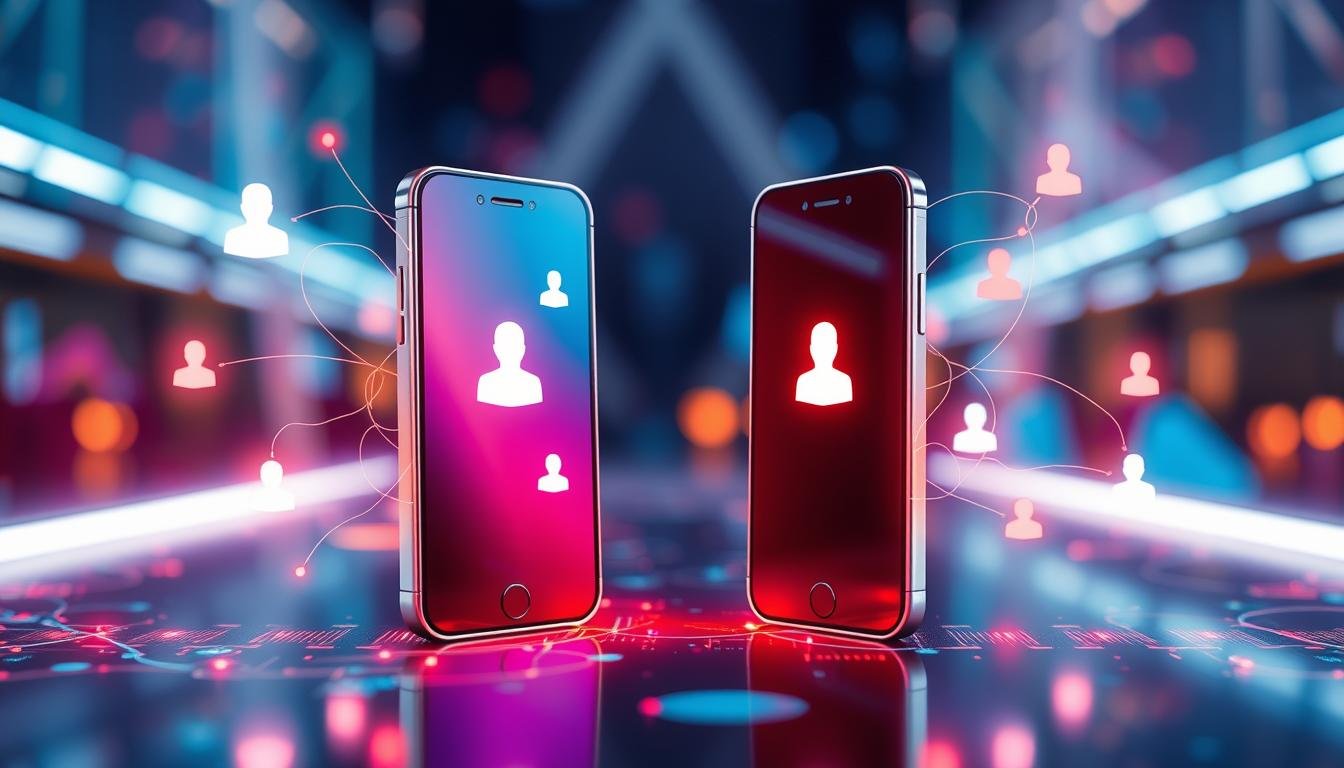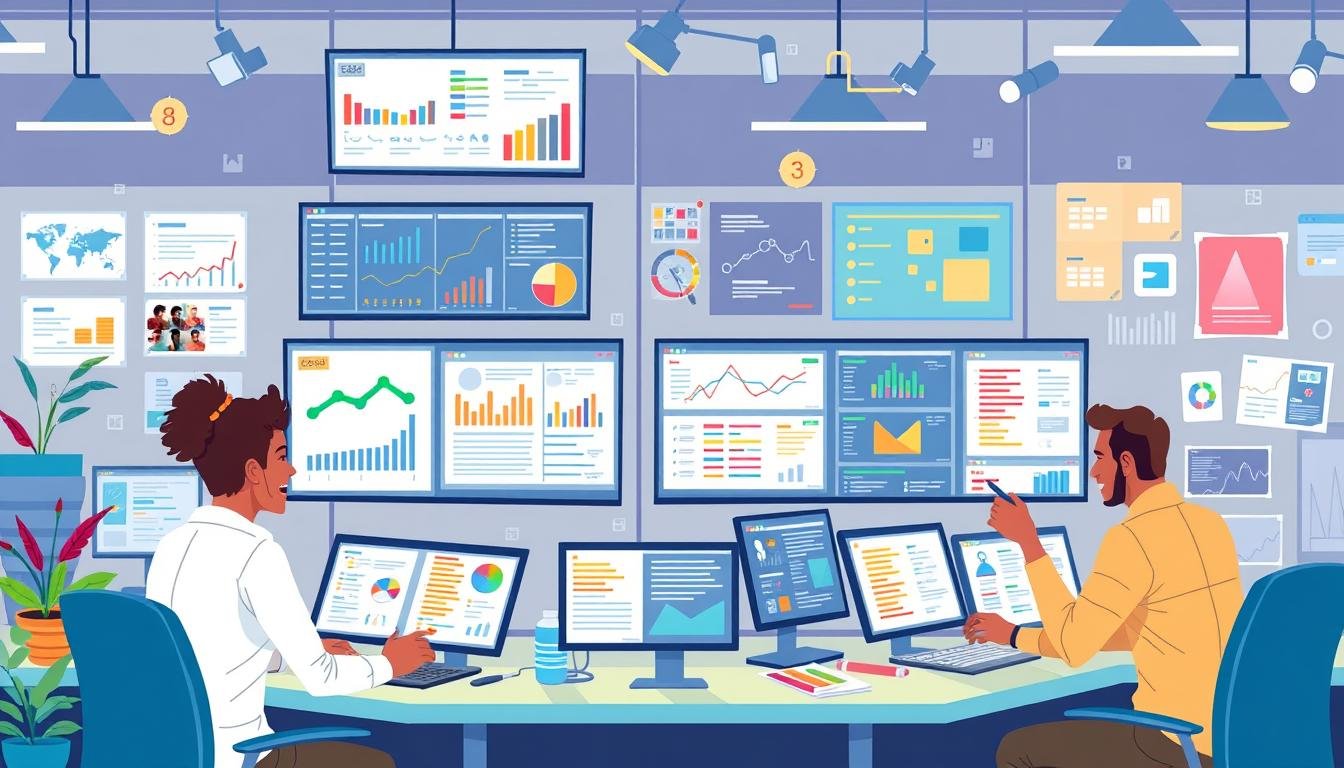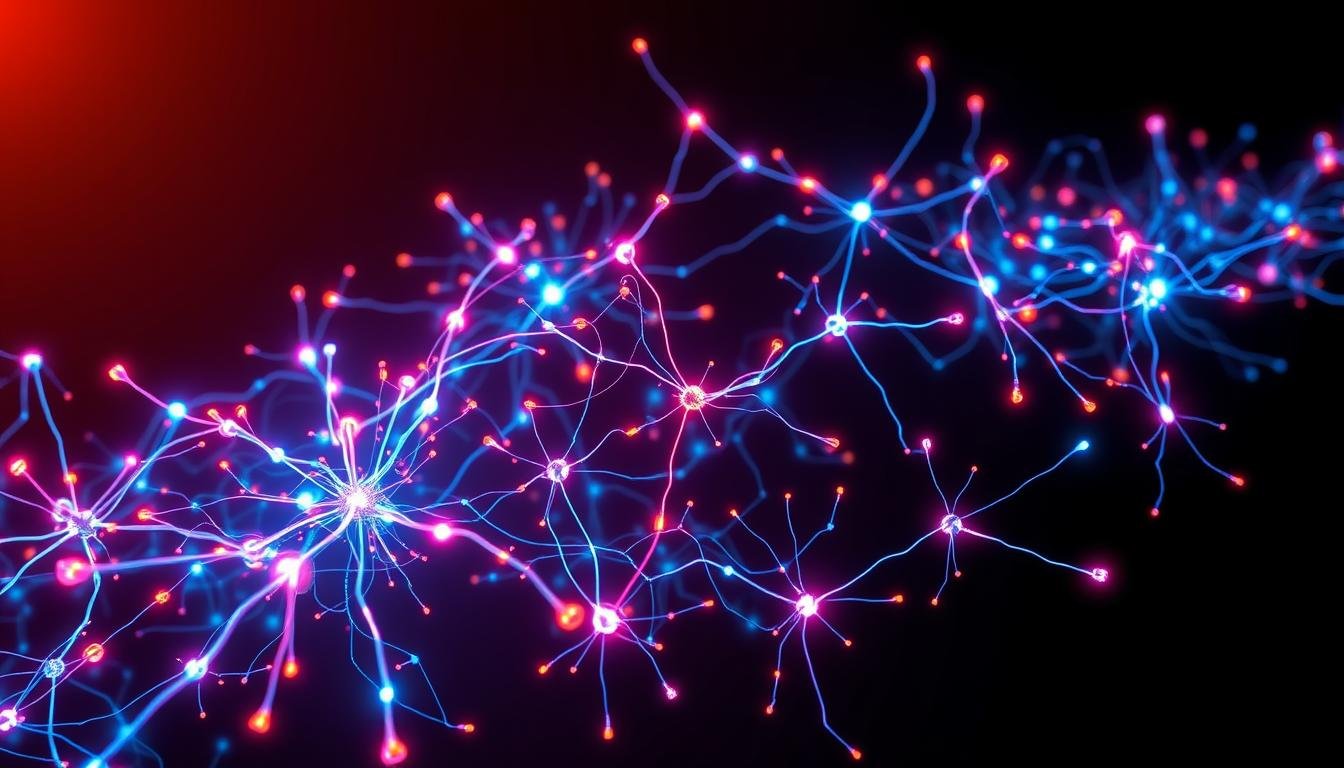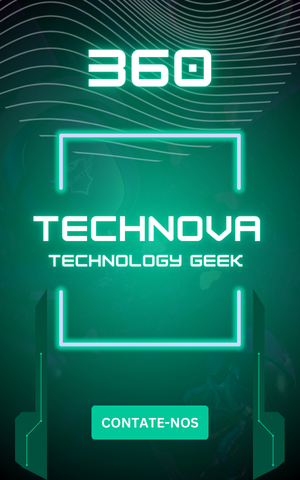Bought a new phone? One of the first things you should do is transfer your contacts list. This way, you can still easily get in touch with friends and family. You also won’t lose the vital details of trusted service providers.
This guide is for Android users who want to transfer phone numbers to another Android phone or to an iPhone. There are several ways to get your contacts across, and none of them require special know-how. We’ll outline each method to help you transfer your contacts quickly and easily.
Key Takeaways
- Learn how to transfer contacts from one smartphone to another, including Android to Android and Android to iPhone.
- Discover multiple methods for contact transfer, including using Google Cloud, SIM card, and third-party apps.
- Understand the importance of backing up and restoring contacts to ensure a seamless transition between devices.
- Explore tips and tricks to make the contact transfer process efficient and stress-free.
- Stay informed about the latest tools and technologies available for managing and transferring contacts between smartphones.
Using Google Cloud to Transfer Contacts Between Android Devices
Transferring contacts from one Android phone to another is easy with Google Cloud. Once you set it up, you won’t have to transfer contacts again. Your contacts will sync across all Android devices linked to your Google account.
Enabling Contact Sync on Your Current Android Phone
Check if your contacts are synced by going to Settings > Accounts > Google. Make sure Contacts is turned on. If not, turn it on, and your contacts will sync to your Google account in minutes. Gmail users will also see their contacts with phone numbers there.
Setting Up Your New Android Phone to Sync Contacts
When setting up a new Android phone, enter your Google account details. If you’re not asked, go to Settings > Accounts > Add new + and pick Google. After signing in, your contacts will show up on your new phone, thanks to Google Cloud sync.
Google Cloud makes moving your contacts from one Android to another easy. You won’t have to manually transfer them or worry about losing data. This keeps your contact list current and accessible on all your Android phones, making the switch smooth and efficient.
Transfer Contacts to an iPhone Using Google Sync
Switching from an Android to an iPhone (or iPad) doesn’t have to be hard. You can easily move your contacts using Google sync.
First, open the Settings app on your iPhone. Then, go to Accounts & Passwords > Add Account > Google. Sign in to your Google account. Your contacts will then sync to the Contacts app on your iPhone.
This method is perfect for transferring android contacts to iphone. It keeps your contact list the same on all your devices. By leveraging the google account sync, your important contacts will be ready on your new iPhone.
| Feature | Benefit |
|---|---|
| Google Contacts Sync | Seamlessly transfer contacts from Android to iPhone |
| Unified Contact List | Maintain a consistent contact database across devices |
| Automatic Updates | New contacts added on one device will sync to the other |
This method is easy and works well. Your Google account makes moving contacts from Android to iPhone simple and stress-free.
Transferring Contacts Using Your SIM Card
Storing contacts on your SIM card is a classic way to move them between phones. It’s great for Android-to-Android transfers. First, check if your SIM card fits your new phone. If it doesn’t, this method won’t work.
To save your contacts to the SIM card on your old phone, open the Contacts app. Go to the settings menu in the top right corner. Look for “Import/Export” or “Export to SIM card.” This will save your contacts to the SIM, ready for your new device.
Importing Contacts from SIM on Your New Phone
Insert the old SIM card into your new phone and open the Contacts app. Then, go to Settings > Import/Export > Import from SIM card. This will move your contacts to your new device. If you’re switching to an iPhone, go to Settings > Contacts > “Import SIM contacts.” After transferring, swap the SIM cards.
| Method | Advantages | Disadvantages |
|---|---|---|
| Transferring Contacts via SIM Card |
|
|
The SIM card method is good for those avoiding cloud storage or Google accounts. Just ensure your SIM card fits both phones for smooth contact transfer.
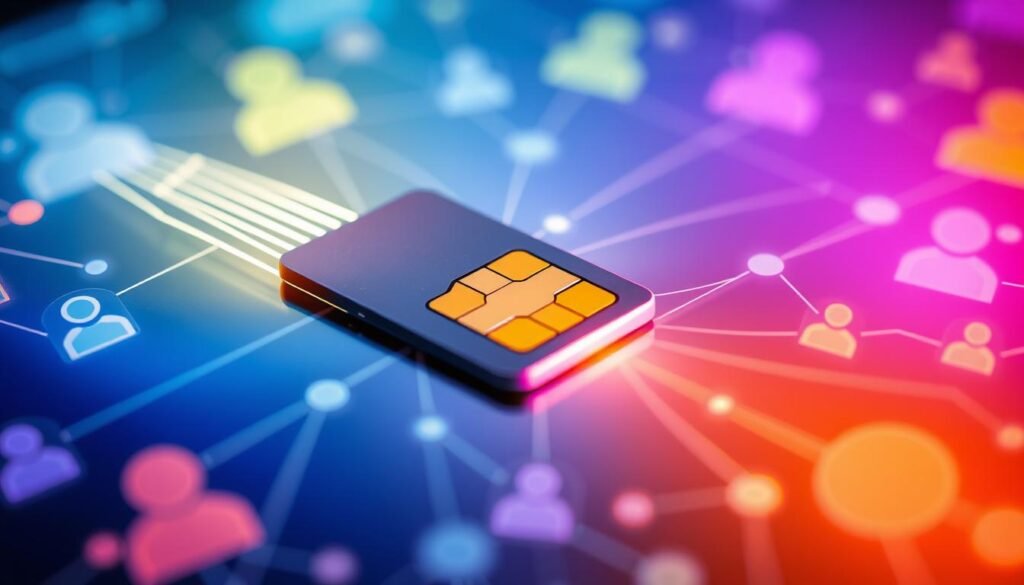
How to Transfer Contacts from One Smartphone to Another: A Step-by-Step Guide
Getting a new smartphone is exciting, but moving your contacts can seem hard. Don’t worry! This guide will help you move your contacts easily, whether you’re switching from an Android or iPhone.
Using your Google account is a simple way to transfer contacts. Enable contact sync on your current Android phone and set up your new device to sync contacts. This keeps your contacts safe and ready on your new phone. It’s great for switching between Androids.
If you’re moving from an iPhone to an Android, using Google Sync is easy. Just sign in to your Google account on both phones. Your contacts will sync across devices.
- Exporting contacts to your SIM card and importing them on the new phone works for both Android and iPhone. It’s a reliable way to transfer contacts.
- Creating a vCard file with your contacts and importing it on the new phone is another good option. It also makes sharing contacts easy with friends and family.
Choose any method, but make sure to back up and restore your contacts during the transfer. This keeps your important contacts safe and lets you stay connected on your new phone.
“Transferring contacts between devices shouldn’t be a hassle. With the right steps, you can seamlessly migrate your contact information and stay connected on the go.”
By following this guide, you can confidently navigate the comprehensive contact transfer guide. You’ll make sure your smartphone migration and contact backup and restoration go smoothly.
Using Apple’s Move to iOS App for Android to iPhone Transfer
Switching from an Android to an iPhone can seem hard. But Apple’s Move to iOS app makes it easy. It helps move your important data like contacts, messages, and photos.
The app creates a secure Wi-Fi link between your devices. This lets you pick what data to move. You can transfer your contacts and messages easily.
The Move to iOS app also suggests iOS apps similar to your Android ones. This makes switching to your new iPhone simple.
To start, download the Move to iOS app on your Android. Then, connect your devices as the app shows. It will help you android to iphone contact transfer safely. The time it takes depends on how much data you have.
Whether you’re moving to iOS or just cross-platform data migration, this app is key. It helps you switch to your new iPhone smoothly. And keeps your important info safe and easy to find.
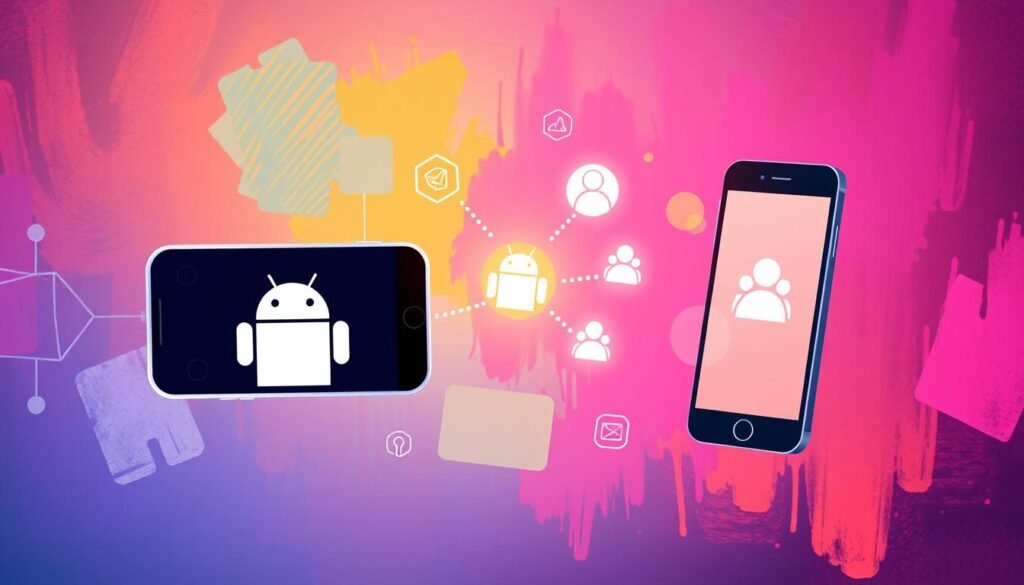
“The Move to iOS app is a game-changer for anyone switching from Android to iPhone. It takes the hassle out of the process and ensures a smooth transition between the two platforms.”
Creating a vCard to Transfer Contacts Between Phones
Creating a vCard, or VCF file, is a great way to move contacts between Android phones. vCards are a universal format for contact info. They work well with many devices and systems.
Exporting Contacts as a vCard File
To start, open the Contacts app on your current Android phone. Here’s what to do:
- Tap the three-dot menu in the top-right corner and select “Select all”.
- Tap the sharing icon, which looks like three dots with lines connecting them.
- Choose the option to export your contacts as a .VCF file.
- Then, send the .VCF file to yourself via email or cloud storage, or directly to your new Android device.
Importing the vCard File on Your New Phone
On your new Android phone, follow these steps to import the .VCF file:
- Download the .VCF file you sent or transferred.
- Find the file in your phone’s file manager or downloads folder.
- Tap on the .VCF file, and your phone will ask to import the contacts.
- Confirm the import, and your contacts will be moved to your new device.
The vCard method is great because it works across different platforms. It lets you easily move contacts between Android devices or even to an iPhone. This makes it a solid choice for vcf file contact transfer, android to android contact migration, and cross-platform contact backup.
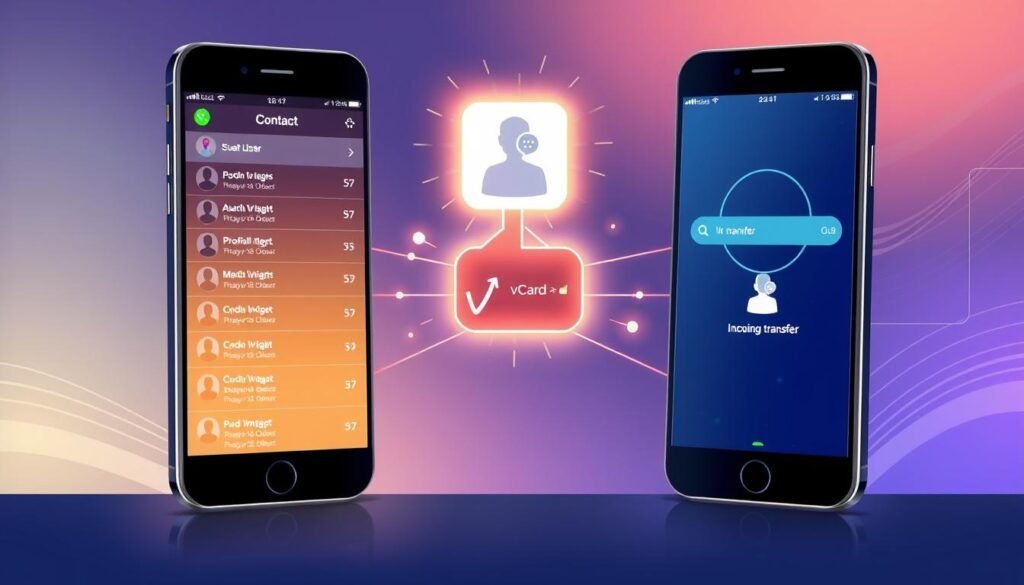
“The vCard method is a game-changer for anyone looking to effortlessly move their contacts between devices, regardless of the operating system.”
Syncing Contacts with Your Google Account
If you have more than one Android device, like one for work and another for personal use, you might find that your google account sync, android contact backup, and cross-platform data sync can get mixed up. The best way to keep your contacts the same on all devices is to sync them to your Google account.
To start, go to Settings > Accounts > Google on your current Android device. Turn on the “Sync Contacts” option. This will save your contacts to your Google account. Then, when you set up a new Android phone, just sign in with the same Google account. Your contacts will then sync across devices without a hitch.
Syncing your contacts to Google has many benefits. It keeps a backup of your contact info in one place. You can also access and manage your contacts from any device or web browser by signing into your Google account. This makes sure your android contact backup is always current and easy to get to, no matter the device.
Also, Google’s cross-platform data sync makes moving your contacts to a new device or even an iPhone simple. By using your Google account, you can easily move your contact list from one device to another. This makes switching devices smooth and keeps your contacts organized across all your devices.
| Feature | Benefit |
|---|---|
| Google account sync | Centralized backup and access to contacts from any device |
| Android contact backup | Ensures your contacts are always up-to-date and secure |
| Cross-platform data sync | Easily transfer contacts between Android and iPhone devices |
By using your Google account, you can make managing your contacts easier. This ensures a smooth switch between Android devices. It keeps your google account sync, android contact backup, and cross-platform data sync working together perfectly.
Transferring Contacts Using Bluetooth
Looking for a simple way to move contacts from one Android to another? Bluetooth is a great choice. It’s easy to use and lets you transfer contacts without cables.
To start, open the Contacts app on your old device. Tap the menu icon (three dots) and choose “Import/Export.” Then, pick “Share name card via” and select the contacts you want to move. Tap “Bluetooth” to start the transfer.
Make sure Bluetooth is on for both devices. Then, pair them. Once they’re connected, your contacts will start moving.
- Open the Contacts app on your old device.
- Tap the menu icon (three dots) and select “Import/Export.”
- Choose “Share name card via” and pick the contacts to move.
- Tap “Bluetooth” to start sharing.
- Turn on Bluetooth for both devices and pair them.
- The contact transfer will start automatically when they’re connected.
This method is quick and easy. It doesn’t need cables or cloud storage. It uses Bluetooth to sync your contacts, keeping them current on all your devices.
“Transferring contacts using Bluetooth is a simple and efficient way to move data between Android devices. It’s a hassle-free process that doesn’t require any additional apps or services.”
Need to move contacts to a new Android or between devices? Bluetooth is a reliable and easy option. Just follow these steps to move your contacts smoothly.
Conclusion
This guide has shown you many ways to move your contacts from one phone to another. You can switch between Android devices or go from Android to iPhone. You’ve learned about using your Google account, SIM cards, vCards, and Bluetooth to transfer your contacts.
With smartphone migration tips and ways to back up and restore contacts, switching phones is easy. You can choose from quick one-click transfers or the ease of Bluetooth. This guide has everything you need to find the best way for you.
Now, when you get a new phone, you can be sure your contacts will be safe. The methods in this guide will help you move your important contacts easily. You’ll stay in touch with friends and work contacts, no matter your new phone.
